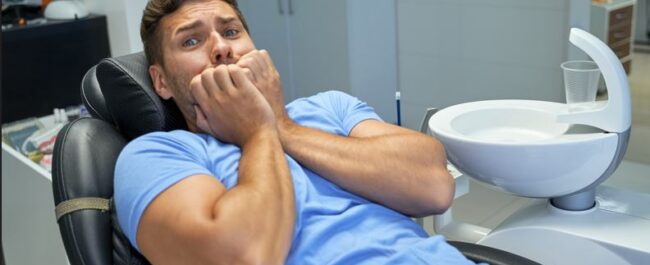What is Dental Anxiety and Is It Common?
Visiting the dentist is a normal part of life for the majority of Canadians. Getting that regular cleaning and check up can help both kids and adults stay ahead of any potential issues, maintain good oral health, and ensure their teeth are in top shape. However, a number of people who visit the dentist do so with a varying level of anxiety. Dental anxiety is a very real and common fear, and it can make visiting the dentist extremely difficult.
Do you have dental anxiety and are a patient at Reflections Dental Oakville? We’re here to tell you – you’re not alone, and we’re here to help. Talk to us about options to help you, including sedation.
What is dental anxiety?
Dental anxiety refers to the fear or stress one might feel when visiting the dentist. For some, this anxiety sets in just by thinking about the upcoming appointment or walking through the door, for others it is manageable until they have to sit in the dentist’s chair. Most people with dental anxiety will react by delaying or avoiding their dental treatments. If a person’s anxiety is bad enough that it results in fear and full avoidance, it can be considered a phobia.
Some signs of dental anxiety can include:
- Sweating
- Increased or irregular heartrate
- Low blood pressure, feeling lightheaded and possibly fainting
- Visible cues like crying, signs of panic, excessive humour, withdrawal or aggression
- Poor sleep leading up to the appointment
- Crying
- Nausea
- Shallow, fast or difficulty breathing, especially when it comes time to start the exam
Causes of dental anxiety
There are many things that can cause dental anxiety, and they will often vary from one person to the next. Understanding some of the causes of dental anxiety can help determine some appropriate ways to deal with and treat it.
Some common causes of dental anxiety can include:
- Intrusion of personal space – Whether it is attached to a previous trauma or just the idea of someone having access to a vulnerable area like their mouth, some people struggle with the dentist getting into their personal space.
- Fear of pain – This is probably one of the most common causes of dental anxiety. While it is quite easy to ensure a dental visit will be pain free thanks to advances in medication, it’s harder to convince an anxious mind of this fact. Fear of pain often comes from a previous painful dental experience, or from stories others have told.
- Fear of needles – The fear of getting an injection or that the injection won’t work to eliminate pain is another common cause of dental anxiety.
- Loss of control – Sitting in a dentist chair with a mouth wide open, unable to see what the dentist or hygienist is doing can bring up feelings of helplessness that can lead to anxiety.
- Self-consciousness or embarrassment – Some patients may have worries about the appearance of their teeth or the smell of their breath.
- A previous traumatic experience – Whether the patient has had a previous bad experience at the dentist, or an unrelated traumatic experience, past trauma can lead to dental anxiety.
- Other clinical diagnosis – Conditions like agoraphobia, claustrophobia and obsessive-compulsive disorder can make visiting the dentist difficult.
How to cope with dental anxiety
There are a wide variety of treatments that can be useful when dealing with dental anxiety, ranging from breathing exercises to medication. It may take a bit of trial and error to figure out the best options for you, but the effort will be worthwhile.
Some coping mechanisms include:
- Learning how to use breathing techniques and meditation
- Distraction techniques like listening to music or watching a movie
- Self-hypnosis techniques like progressive muscle relaxation
- Visiting a hypnotist to reduce triggers
- Discussing a stop signal with your dentist
- Bring a weighted blanket or comfort item to the appointment
- See a psychologist to learn some therapeutic techniques or to get a medication prescription for severe cases
- Talk to your dentist about sedation possibilities. Many can offer laughing gas, conscious sedation or general anaesthesia
Talk to your dentist if you have anxiety
Being open with your dentist about your anxiety is the best way to ensure a successful visit. When they are aware of your limits and triggers, your dentist will be able to work with you to ensure you are comfortable throughout your visit.


